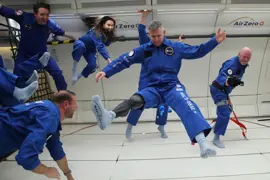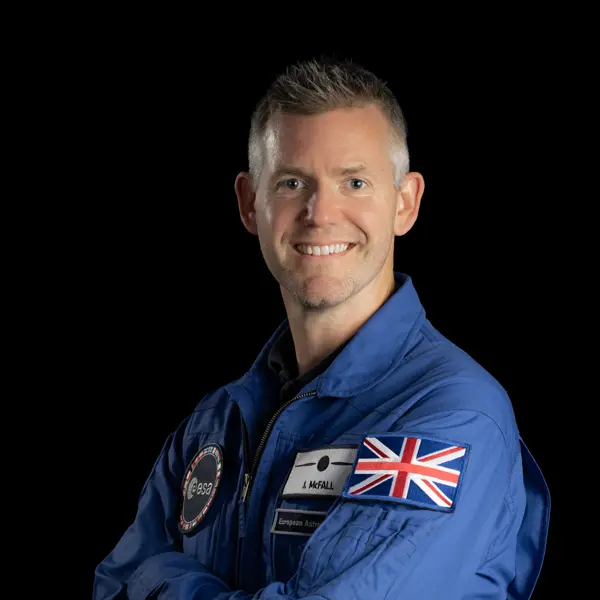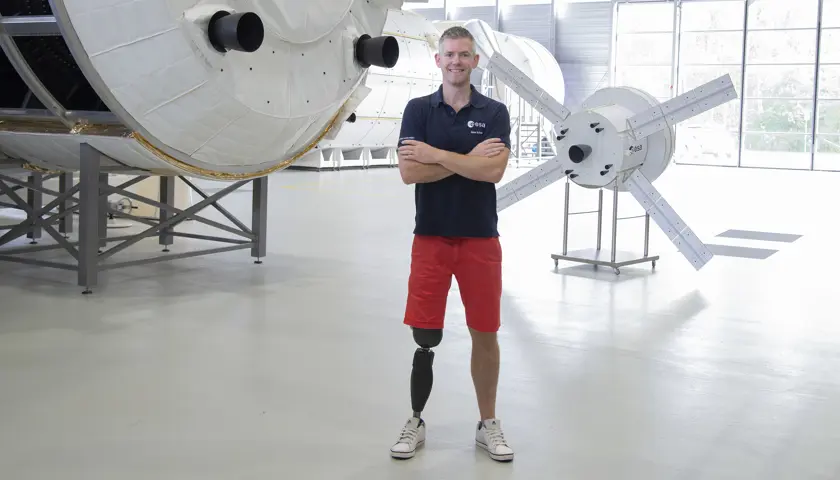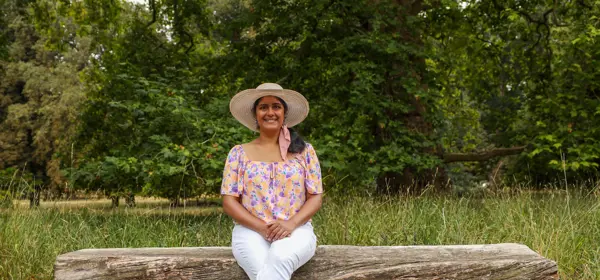
One giant leap: the British doctor set to become the first astronaut with a disability
Having become a surgeon and Paralympic medallist following a serious accident, it's tempting to say the sky's the limit for John McFall ... but now he has been cleared to go into space. He tells Seren Boyd about the rigorous training, how his prosthetic leg got a space-age redesign and why we should all do something we love
It was a chance conversation with a colleague that prompted an abrupt fork in John McFall’s career path – and promised to launch him into the history books.
ESA (European Space Agency) was looking for candidates to be the world’s first astronaut candidate with a physical disability. Would he consider applying?
This was not an idle comment to a man of Mr McFall’s mettle. As well as being a trauma and orthopaedic specialist registrar, he was a Paralympian who took bronze in the 100-metre sprint at Beijing 2008.
And he had rebuilt his life at 19 after his right leg was amputated above the knee following a motorbike accident in Thailand.
And so, not long before his FRCS exams, Mr McFall applied to become the world’s first astronaut with a disability.
Now, after four years of rigorous assessment and training, he has been cleared to take part in a six-month mission to the ISS (international space station) and is poised to become the first person with a disability ever to go into space.
If, that is, a suitable mission is ever approved.
Unmissable opportunity
For all that uncertainty, and for all the self-discipline his three careers imply, Mr McFall doesn’t conceal his excitement.
‘Space was never really on my radar, if I’m honest, until one of my colleagues, a fellow orthopaedic surgeon, told me about the opportunity at ESA. But it really was an opportunity I couldn’t not take.’
Of the more than 22,500 people who applied to join ESA’s ‘2022 class’, he was one of only 17 successful candidates and the only one with a disability.
His medical colleagues have been ‘super jealous but really supportive’ – and perhaps not surprised. ‘Some of them did say: “Of course it’s going to be you, McFall.”’
The possibility of taking a person with a disability into space has never been scoped out before, so the journey to lift-off is long and challenging.
My colleagues have been super jealous but really supportive
John McFall
In medicine, his disability ‘really didn’t matter’; it had been a prerequisite for Paralympic sport. ‘But here, it’s important for me to demonstrate that I am equally capable and that I have earned my position and my role.’
The recruitment process – where ESA was trying to establish which types of disability might be appropriate for space travel – took 18 months, concluding with Mr McFall’s selection in November 2022.
Soon after his orthopaedic exit exams, he left his job in Hampshire, relocated his young family to Germany and started work as a subject matter expert for ESA's feasibility study, FLY!, at the European Astronaut Centre in Cologne.
The subsequent 18-month study had to demonstrate it was technically possible to fly an amputee on a long-duration mission to the ISS, to the satisfaction of all ESA member states ‘without imposing significant financial or operational burdens’.
‘The space station, the spacecraft and the procedures, including the emergency procedures, are not designed for people with disabilities so the way we have had to approach this is: can I meet the existing requirements?’
Mr McFall proved himself equal to other candidates in everything from sea-survival to physical training to astrophysics classes. Yet, zero-gravity parabolic flights highlighted the need for a redesign of his prosthesis.
His prosthesis has to be wearable in space and on land. He would need it in the event that the crew had to make an emergency exit from the capsule while still on the launchpad, via a slidewire, for example. He would also need it in space to exercise or to stabilise his feet while doing tasks with his hands.
Despite all this, in December 2024 he passed muster to potentially be a fully integrated crew member.
For this ‘mission ready’ phase, he has had to attain medical certification from a board comprising all the ISS’s international partners and their medical teams. Proposals for the kind of scientific studies undertaken on any mission involving Mr McFall have been invited and shortlisted. The prosthetic hardware certification for a long-duration mission to the ISS – the third and final element – should be achieved by late-October.
Achieving medical certification is in itself an important milestone in the history of human spaceflight. Mr McFall wants his involvement to have a legacy; proving it is technically feasible to take a lower-limb amputee into space lays the foundations for studies involving astronauts with other types of disability.
But his ultimate goal is to fly.
One possibility would be a six-month mission to the ISS; roughly once a year one European is selected to join its seven-strong crew.
‘In the next six to 12 months, we will know more about what the future holds,’ Mr McFall says.
His medical background does mean he could be allocated to be the crew medical officer, although there's no guarantee he would be designated that role.
‘As long as there’s no medicine and it’s just carpentry, I’m fine,’ he laughs.
New insights
Precisely why ESA wants to study disability in space is a complex question.
Inclusion in space exploration matters – and not just in the apocalyptic scenario that we all have to decamp to Mars. The desire to ‘explore, push boundaries and learn’ is intrinsic to human scientific endeavour.
Equally, however, exploring the skills, expertise and knowledge of people outside the ‘able-bodied’ community might offer new insights, Mr McFall suggests.
‘I’ve felt very welcomed here,’ he says. ‘I've got such a broad foundation of science, but also maybe a particular approach to life and attitude and communication skills. And I just happen to have a disability. Why exclude someone when what they bring into the programme can be incredibly useful and generate growth?
‘I think sewn up in that message as well is increasing people's awareness of disability and challenging people's preconceptions. And the more we do this, the less we focus on that person's disability, and [the more] people with disabilities are accepted as completely regular, equal members of society. It takes time.’
I don’t want to succeed because of positive discrimination: I want to be here because I’m bloody well good enough
John McFall
ESA discourages use of the term 'parastronaut', although Mr McFall is happy enough with it, just as he is proud to be a Paralympian.
‘The risk is that every time someone with a disability does something new, bold and different, and the media puts the term “para” in front of it, there is automatically some sort of difference between what they have done and what able-bodied people have done.
‘I don’t want to succeed because of positive discrimination: I want to be here because I’m bloody well good enough.’
Inevitably, then, there is added pressure to prove himself. ‘But I've been very fortunate that I've been on a tremendous journey in my life, that I feel very comfortable in my own skin. I know that I've got here because of my skills, my attributes and my ability, and I just need to keep on doing that. Sometimes, I catch myself feeling slightly daunted that I am the only one in the world in this situation and there is, in places, expectation. But I'm confident that I will do whatever is required of me.’
The only worry that he admits to is ‘not going’ to space.
The scrutiny that Mr McFall has undergone in recent years has prompted some introspection, too.
In a recent conversation with his mother about his own children’s aspirations, she asked if being from a military family had put pressure on him to push himself.
‘And I said: “Absolutely not.” I never felt pressured as a child to do the things that I did: always wanting to choose the hardest path, always wanting to challenge myself.
‘My expectations are hard wired to be pretty high. I don't know why: they just are. I think I have come to the conclusion that it is very natural in me. I can't stand to celebrate mediocrity.’
'How lucky we are'
Medicine – and specifically orthopaedics – has always been ‘hugely rewarding’ in that sense. Though he was happy to step back from his medical career, given the unique opportunity presented to him, he implies he is not ready to relinquish medicine just yet.
‘I would find it very difficult to say, “I was a doctor”, or “I was a surgeon”. Sometimes when you're in the trenches, as it were, working as a doctor in the NHS, it can be hard to see the wood for the trees and what you enjoy, and what's of value, and you feel sometimes like just another number on a rota slot.
‘But, having had the opportunity to step out and be exposed to the world of space exploration, I’ve got a huge amount of respect for the medical profession. What we do in medicine is incredibly special, and medics are an incredibly special bunch of people.’
Surely, however, the NHS would seem mundane and frustrating for someone who had viewed it from space?
‘I think you've got to sift through all the shit that the gold nuggets of the NHS sit in. I really wish we could continue to deliver what the NHS purported to want or aspired to deliver in the first place.
‘But maybe when you have this ability to look at the Earth from space and look at all these nations and all their respective healthcare systems, or lack of them, it would reinforce how lucky we are in the UK to have a national health service. And we also have incredibly good standards expected and incredibly well-educated medical staff.
‘I wouldn't find it particularly difficult [afterwards] to get out of bed every morning and be a surgeon. That is my barometer: do something you love, do something that makes you want to get out of bed in the morning.’
(Main image credit: ESA – A Conigli)




